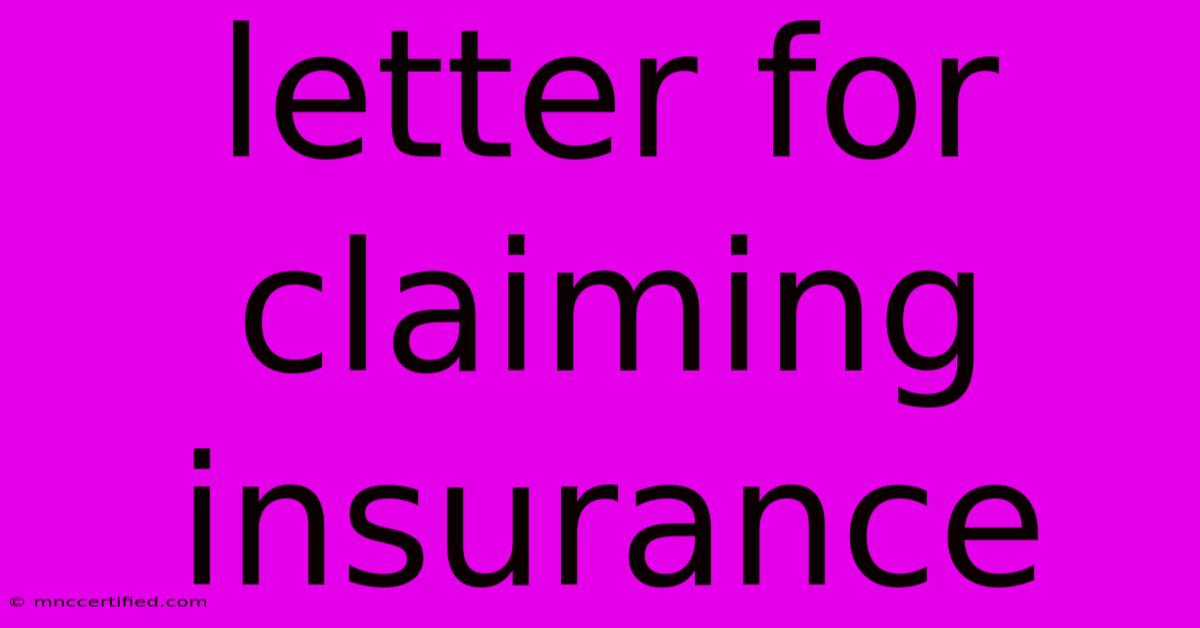Letter For Claiming Insurance

Table of Contents
How to Write a Winning Insurance Claim Letter
Filing an insurance claim can be stressful, but a well-written letter significantly increases your chances of a smooth and successful process. This guide provides a step-by-step approach to crafting a compelling insurance claim letter that gets results. We'll cover everything from essential information to include to tips for maintaining a professional and persuasive tone. Learning how to write an effective insurance claim letter is crucial for maximizing your chances of receiving the compensation you deserve.
Understanding the Importance of a Strong Claim Letter
Your insurance claim letter is often the first formal communication you have with your insurance provider after an incident. A poorly written or incomplete letter can lead to delays, denials, or even the complete rejection of your claim. Conversely, a clear, concise, and well-documented letter demonstrates your professionalism and strengthens your case. A strong insurance claim letter sets the stage for a positive interaction with your insurer and speeds up the claim process.
Essential Elements of Your Insurance Claim Letter
Your letter should include the following key elements:
1. Your Contact Information:
- Your Full Name: Clearly state your full legal name.
- Your Address: Provide your current and accurate mailing address.
- Phone Number: Include a reliable phone number where you can be easily reached.
- Email Address: Add your email address for faster communication.
- Policy Number: This is crucial for identifying your policy quickly. Keep it readily accessible.
2. Date of Incident and Claim:
- Date of Loss: Specify the exact date the incident occurred.
- Date of Claim: Note the date you are submitting your claim. This helps with tracking the timeline.
3. Detailed Description of the Incident:
- What happened? Provide a clear and concise account of the event that led to the claim. Be objective and avoid emotional language.
- Where did it happen? Specify the location of the incident. Include addresses if relevant.
- Who was involved? List all individuals involved, including witnesses if any.
4. Itemized List of Damages and Losses:
- Specific details: Don't just say "damaged car." Detail specific damages, like "dented front bumper, broken headlight, and cracked windshield."
- Supporting documentation: Mention any supporting documents included, such as repair estimates, police reports, or photos.
- Quantifiable losses: Clearly state the monetary value of your losses. This is especially important for claims involving property damage or medical expenses. Use receipts and invoices to back up your figures.
5. Policy Information:
- Policy type: Specify the type of insurance policy (e.g., homeowners, auto, health).
- Policy number: Again, reiterate your policy number.
6. Your Request:
- Clearly state your desired outcome: Are you seeking reimbursement for repairs, medical expenses, or other losses? Be specific and direct.
Crafting a Professional and Persuasive Letter
- Formal Tone: Maintain a professional and respectful tone throughout the letter. Avoid accusatory or demanding language.
- Clear and Concise Language: Use simple, straightforward language and avoid jargon.
- Proofread Carefully: Thoroughly proofread your letter for grammar and spelling errors before sending it.
- Organized Structure: Use clear headings and bullet points to make your letter easy to read and understand.
- Attach Supporting Documents: Ensure all supporting documents are securely attached.
Example of a Strong Insurance Claim Letter:
[Insert a sample letter here, following all the guidelines mentioned above. This sample should include placeholder information that the reader can replace with their own details.]
Following Up on Your Claim Letter
After submitting your insurance claim letter, follow up with the insurance company if you don't receive a response within a reasonable timeframe. Keep records of all communication, including dates, times, and names of individuals you spoke with.
Seeking Professional Help
If you're struggling to write your claim letter or if your claim is complex or has been denied, consider seeking assistance from a legal professional or a public adjuster.
By following these steps and creating a well-organized and persuasive insurance claim letter, you significantly increase your chances of a successful claim resolution. Remember, clear communication is key to a positive outcome.

Thank you for visiting our website wich cover about Letter For Claiming Insurance. We hope the information provided has been useful to you. Feel free to contact us if you have any questions or need further assistance. See you next time and dont miss to bookmark.
Featured Posts
-
Tmj Headaches Causes And Zoe Balls Story
Nov 29, 2024
-
Tmj Explained Zoe Balls Experience
Nov 29, 2024
-
Mc Donalds Thanksgiving Hours Open Or Closed
Nov 29, 2024
-
Misfits Boxing 19 Who Won Gib Vs Slim
Nov 29, 2024
-
Madden Thanksgiving Patches An Nfl Look
Nov 29, 2024